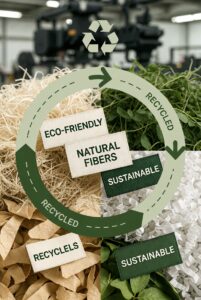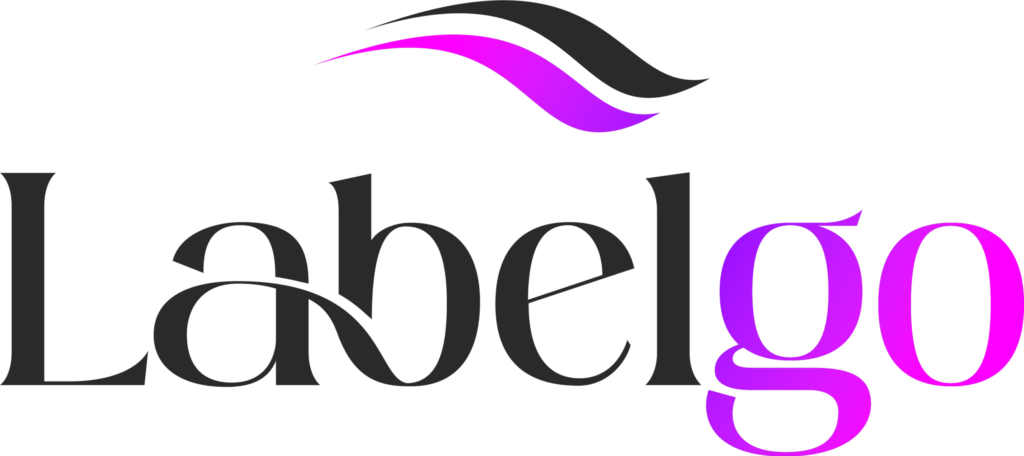Sustainability is no longer a secondary topic in the fashion industry. Instead, it has become a core requirement for brands that want to remain competitive and credible. As consumers grow more conscious, they expect responsibility not only in fabrics and production but also in every component of a garment—including labels. Therefore, sustainable labeling now plays a critical role in modern fashion strategies.
At LabelGo, sustainable labeling is treated as a technical and measurable process. Material selection, production efficiency, durability, and environmental impact are all evaluated across the full lifecycle of the label.

The Growing Demand for Sustainable Fashion Components
Fashion brands are under increasing pressure to reduce waste, lower carbon footprints, and improve transparency. Labels—woven, printed, cardboard, care, and size labels—are part of this equation. Although small in size, labels are produced in large volumes and are directly linked to material consumption, energy use, and end-of-life disposal.
Sustainable labeling addresses these challenges by:
Reducing non-essential materials
Selecting recyclable or biodegradable substrates
Optimizing production workflows to minimize waste
Ensuring labels last as long as the garment itself
This approach aligns closely with the principles discussed in The Environmental Benefits of Using Sustainable Label Materials, where material choice directly impacts environmental performance.
Sustainable Labels Strengthen Brand Identity
Moreover, labels act as a direct communication tool between brands and customers. A responsibly produced label signals quality, professionalism, and trust. Consequently, sustainable labeling supports long-term brand value rather than short-term trends.
This approach reinforces broader branding strategies discussed in The Importance of Custom Labels in Building Brand Identity and How Custom Labels Help Build a Recognizable Fashion Brand?. When sustainability and design work together, labels become a strong brand asset instead of a simple accessory.
Material Innovation in Sustainable Labeling
Advances in label manufacturing now allow brands to adopt sustainable options without compromising performance or aesthetics. Common approaches include:
Recycled yarns for woven labels
Organic or responsibly sourced cotton for printed labels
FSC-certified cardboard for hang tags
Optimized dye processes to reduce water and chemical usage
These innovations integrate seamlessly with both traditional and digital workflows, especially when combined with tools explored in The Benefits of Digital Label Design and Customization Tools and AI-Supported Labeling for Faster and More Accurate Production.

Woven, Printed, and Cardboard Labels: Sustainability Considerations
Each label type has unique sustainability characteristics:
Woven labels offer exceptional durability, reducing the need for replacement and supporting garment longevity—an idea further detailed in How Do Woven Labels Reflect the Quality of Your Brand?
Printed labels can be optimized for low-impact inks and minimal material use, as discussed in The Role of Printed Labels in Modern Clothing
Cardboard labels (hang tags) provide an opportunity for recyclable, plastic-free branding, reinforcing messages explained in Cardboard Labels (Hang Tags) and Their Importance in Branding
Selecting the right combination is essential, as outlined in Woven Labels, Cardboard Labels & Printed Labels: Find the Perfect Match for Your Brand.
Compliance, Transparency, and Consumer Trust
Sustainability is closely tied to compliance and transparency. Care labels, origin labels, and composition information must remain legible throughout a garment’s life. Sustainable materials must therefore meet both environmental and regulatory standards, aligning with topics such as What Are Care Labels and Why Are They Legally Required? and Why “Made in [Country]” Labels Still Matter to Consumers.
When sustainability and compliance are engineered together, brands reduce risk while strengthening consumer confidence.
Sustainability as a Long-Term Competitive Advantage
Brands that invest in sustainable labeling gain more than environmental benefits. They achieve:
Improved brand perception
Stronger alignment with retailer and marketplace requirements
Reduced material waste and optimized production costs
Enhanced storytelling opportunities at point of sale
This narrative-driven approach connects naturally with The Art of Storytelling Through Product Labels, where labels become a medium for communicating values, not just information.
Conclusion: Sustainable Labeling Is a Strategic Necessity
In modern fashion, sustainability must be embedded at every level of product development—including labels. Sustainable labeling is not a trend; it is a structural shift driven by consumer expectations, regulatory frameworks, and responsible manufacturing practices.
By engineering labels with sustainability, durability, and clarity in mind, fashion brands position themselves for long-term success in a competitive and environmentally conscious market.
